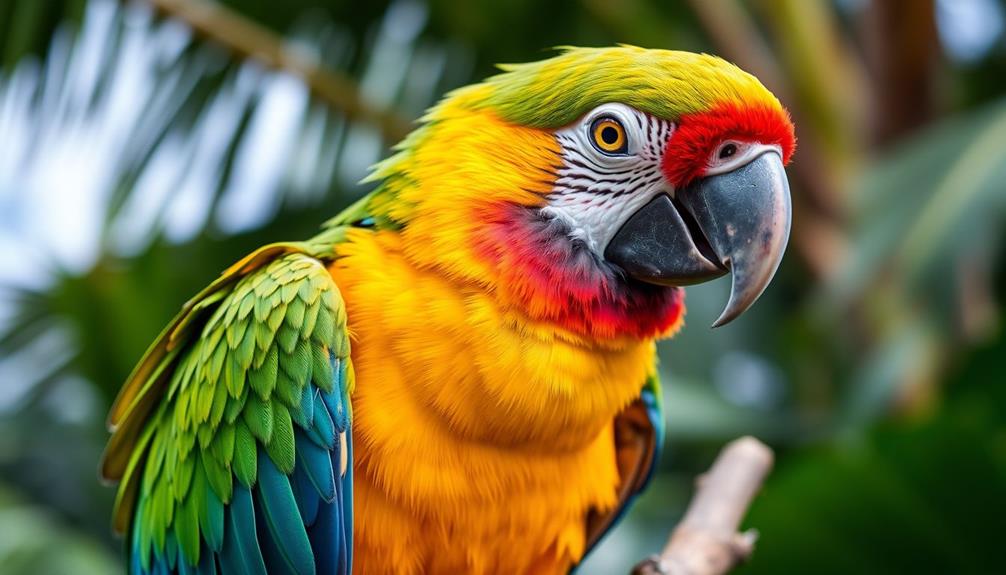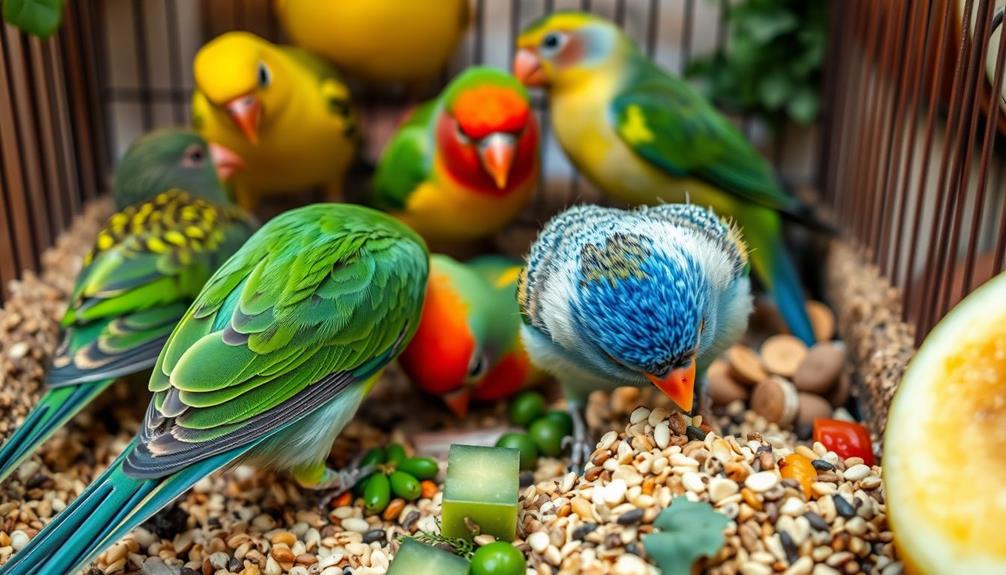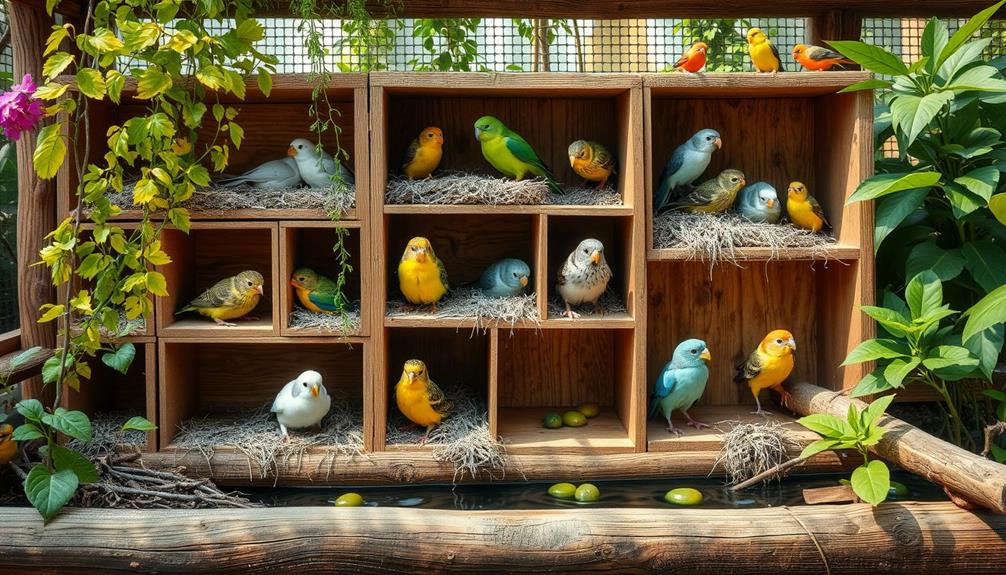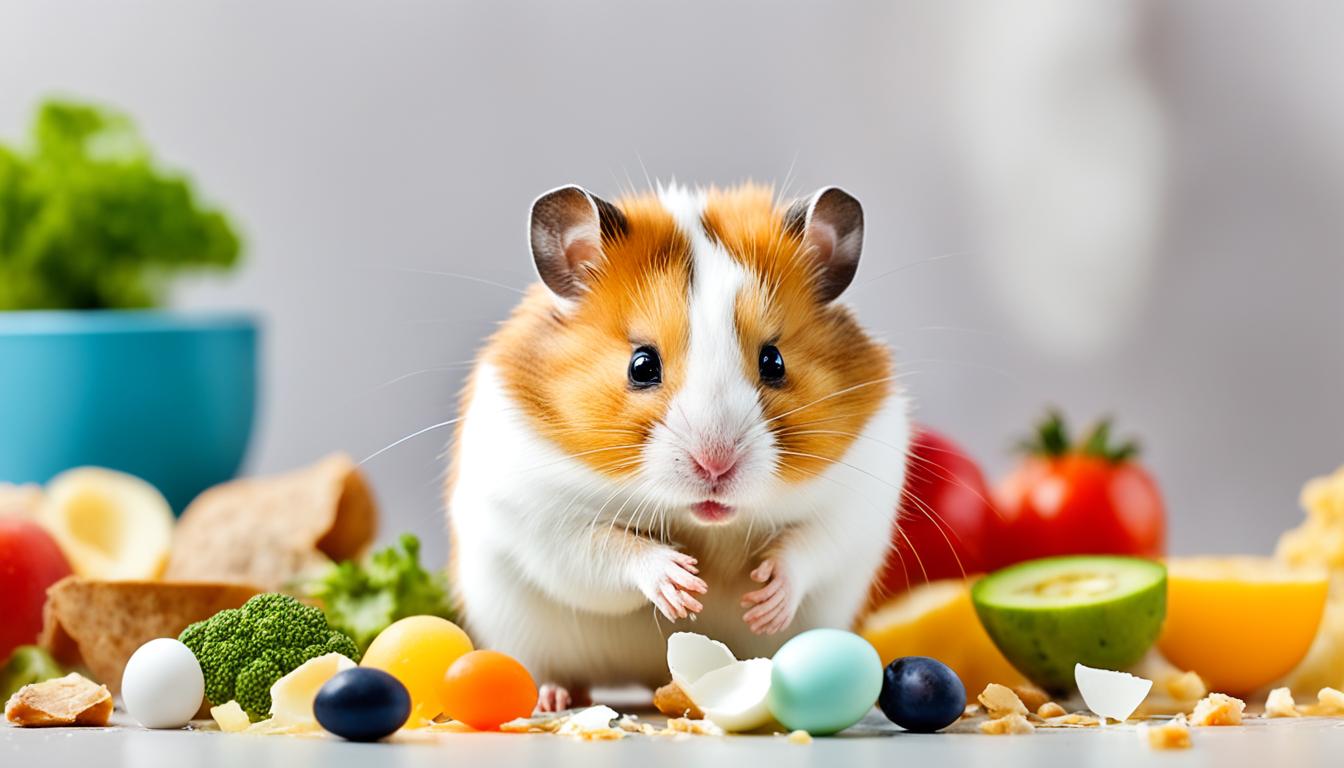Bird breeding can be tricky with various challenges like infertility, nutritional deficiencies, and stress from overcrowding. You'll want to keep an eye on your birds for symptoms such as fluffed feathers, lethargy, or changes in appetite. Ensuring a balanced diet and maintaining ideal environmental conditions, like proper temperature and humidity, is vital. Genetic diversity is also important to prevent health issues in offspring. Don't forget to monitor their behavior and consult with experienced breeders or veterinarians for expert advice. By staying informed, you'll better navigate these challenges and improve your chances of breeding success. Discover more insights ahead.
Key Takeaways
- Infertility and genetic issues can hinder breeding success; monitor parental health and conduct genetic testing for informed pairings.
- Nutritional deficiencies impact reproductive health; provide a balanced diet rich in essential vitamins and minerals for breeding birds.
- Stress from overcrowding and inadequate space can reduce mating behaviors; ensure minimum space requirements and social interaction for birds.
- Environmental conditions, including temperature and humidity, are crucial; maintain ideal levels to create a comfortable breeding environment.
- Genetic diversity is vital to prevent inbreeding risks; source birds from different breeders and conduct lineage studies for healthy offspring.
Common Breeding Problems
Breeding birds can be rewarding, but common problems often arise that challenge even the most dedicated aviculturists. One notable issue is infertility, where eggs are laid but fail to develop. This can stem from various factors, including genetic issues or poor health of the parents.
Additionally, incorporating a holistic lifestyle approach that revolves around proper nutrition and stress management can help improve the overall health of your breeding pairs. You might also encounter stress factors, like overcrowding in your aviaries, which can cause anxiety in your birds, leading to reduced mating behavior.
Nutritional deficiencies are another major concern. If your breeding pairs lack essential vitamins and minerals, it can greatly impact their reproductive health and the viability of their eggs.
Inbreeding poses additional risks, as it can lead to genetic disorders in offspring, resulting in decreased survival rates and health complications.
Lastly, environmental conditions play a vital role in breeding success. Make sure the temperature and humidity levels are appropriate, and provide safe nesting materials to encourage successful breeding.
Symptoms of Health Issues

When you're caring for birds, it's essential to monitor for symptoms that could signal health issues.
Watch for changes like fluffed feathers, lethargy, or abnormal droppings, as these can indicate underlying problems.
It's also important to guarantee their diet is balanced, as poor nutrition can lead to health complications.
Early detection is key, so pay attention to any behavioral shifts that might suggest your bird needs veterinary care, especially considering dog health tips that emphasize the importance of monitoring pets' well-being.
Common Symptoms to Monitor
Monitoring your birds for common symptoms of health issues is essential, as early detection can greatly improve their chances of recovery. One of the first signs you might notice is fluffed feathers, which often indicate stress or illness.
Additionally, behavioral changes such as increased aggression or withdrawal from social interaction can also signal underlying health concerns, similar to how cats show signs of separation anxiety. Pay close attention to your birds' energy levels; lethargy coupled with changes in appetite can signal serious underlying problems that need immediate veterinary attention.
Keep an eye on their droppings as well. Abnormal droppings, like those that are excessively watery or discolored, may suggest gastrointestinal disturbances or infections.
Additionally, watch for respiratory symptoms such as wheezing or labored breathing, which could indicate respiratory infections requiring prompt diagnosis and treatment.
You should also monitor their behavior. Common symptoms like increased aggression or withdrawal from social interaction can be early indicators of health issues.
Regular observation allows you to catch these signs quickly, ensuring your birds receive the care they need before conditions worsen. By staying vigilant about these common symptoms, you can help maintain the health and well-being of your breeding birds.
Behavioral Changes Indicating Illness
Changes in your birds' behavior can be some of the clearest indicators of health issues. You should watch for behavioral changes indicating illness, as they often signal underlying problems that need immediate attention.
For example, if your bird's feathers appear fluffed up and it seems lethargic, these could be signs of distress. A sudden loss of appetite or shifts in feeding habits are also red flags, so keep a close eye on what and how much your bird eats.
It's important to recognize that, similar to humans, stress can impact birds' health, leading to mental health support needs in some cases.
If you notice prolonged straining during egg laying or abnormal posturing, these may indicate reproductive issues that require veterinary evaluation. Additionally, increased aggression or withdrawal from social interactions could suggest stress or illness, making it vital to observe any changes in behavior closely.
Don't forget to monitor other symptoms, such as abnormal droppings or signs of respiratory distress. Regular observation can help you catch health issues early, allowing for prompt veterinary intervention when necessary.
Importance of Early Detection
Recognizing the significance of early detection in birds' health can make a considerable difference in outcomes. As a bird owner, you're the first line of defense. Symptoms like lethargy, fluffed feathers, and changes in appetite shouldn't be ignored; they often indicate serious, underlying health issues that require prompt veterinary intervention.
Incorporating gentle yoga stretches into your routine can also help alleviate stress, which is crucial for both you and your birds' well-being.
Keep an eye on your bird's behavior, especially during egg-laying. Prolonged straining or abnormal posturing can signal reproductive complications, making immediate assessment critical. Regularly monitoring droppings is also fundamental; changes in color or consistency can be indicators of gastrointestinal distress or infections.
Behavioral shifts, such as increased aggression or withdrawal, can be early signs of stress or health issues that need addressing. By being vigilant, you guarantee that your birds are protected and can seek timely help.
Utilizing diagnostic tests like radiography or ultrasound can aid in early problem identification, boosting the chances of effective treatment and recovery. Remember, the sooner you catch a health issue, the better the outcome for your feathered friends. Your proactive approach can make all the difference in their well-being.
Importance of Nutrition

Understanding the importance of nutrition is essential for successful bird breeding. Proper nutrition guarantees that both male and female birds have the energy and health they need to mate and care for their offspring. A balanced diet rich in vitamins, minerals, and proteins promotes ideal reproductive health, reducing the risk of infertility and chick mortality.
Additionally, incorporating a variety of foods can help mimic their natural diet, providing a more holistic approach to their care, similar to how vegan diets promote ideal health for those who choose plant-based lifestyles.
When you focus on nutrition, you're also fortifying your birds' immune systems. Nutritional deficiencies can weaken their defenses, making them more susceptible to infections and diseases that can harm breeding outcomes.
To support healthy egg production and chick development, provide fresh fruits, vegetables, and high-quality pellets specifically formulated for breeding birds.
It's important to regularly monitor the diet and adjust it according to the specific needs of your breeding pair. This proactive approach can greatly enhance the likelihood of successful breeding and healthy offspring.
Environmental Factors

When it comes to breeding, creating ideal nesting conditions is vital for your birds.
You need to pay attention to temperature and humidity levels, as well as guarantee they've enough space and enrichment to thrive.
Providing a suitable environment allows birds to feel secure and encourages them to breed, while factors such as well-draining soil can also play a role in their overall health.
These environmental factors directly impact their willingness to breed successfully, so getting them right is imperative.
Optimal Nesting Conditions
Creating ideal nesting conditions is essential for successful bird breeding. To encourage birds nesting, you need to provide a quiet, low-traffic environment. This helps reduce stress and fosters natural breeding behaviors.
The best nesting conditions for most bird species involve maintaining a temperature range of 70°F to 80°F (21°C to 27°C). This temperature is critical for proper egg incubation. Additionally, incorporating natural materials in your surroundings can evoke a sense of comfort and security for the birds, similar to modern farmhouse decor trends.
Humidity also plays an important role in these conditions. Aim for levels between 40% to 60% to prevent egg dehydration and support healthy embryo development. Additionally, offering a variety of safe nesting materials, such as untreated wood shavings, grasses, and feathers, can stimulate the natural instincts of breeding pairs, making them more likely to settle down.
Don't forget to regularly clean the nesting areas. A hygienic environment not only prevents disease but also encourages birds to utilize the nesting space.
Temperature and Humidity Levels
Maintaining the right temperature and humidity levels is fundamental for successful bird breeding. You should keep the temperature between 70°F and 80°F (21°C to 27°C). Extreme temperatures can stress your birds, negatively affecting their reproductive behaviors and overall health.
Additionally, understanding the impact of altitude acclimatization can be significant, as it enhances overall vitality which may benefit breeding conditions. It's also important to monitor humidity levels, ideally between 40% and 60%. Excessive dryness might lead to dehydration, while high humidity can cause respiratory issues and encourage fungal growth.
Sudden fluctuations in either temperature or humidity can disrupt hormonal cycles, which may lead to infertility or egg abandonment. To prevent these issues, guarantee proper ventilation in your breeding area. Good airflow helps regulate temperature and humidity levels, preventing the buildup of harmful gases and maintaining a fresh air supply.
Invest in thermometers and hygrometers to monitor these environmental conditions regularly. Keeping a stable habitat is key to encouraging successful breeding.
Space and Enrichment Needs
To foster a thriving breeding environment, adequate space and environmental enrichment are essential for your birds. Aim for at least 10 cubic feet of space per bird, allowing them to move freely and engage in natural behaviors. This space is important for their overall well-being and can greatly influence their breeding success.
Additionally, much like the preservation of traditions among the Hopi Tribe, creating a stable environment helps maintain the cultural identity of your birds.
Incorporate environmental enrichment by providing a variety of toys, perches, and foraging opportunities. These elements not only prevent boredom but also encourage mental stimulation, enhancing your birds' health and breeding outcomes. Make sure you provide proper nesting materials that are species-appropriate and non-toxic, creating a comfortable and safe space for breeding.
Social interaction is another essential factor. Many bird species thrive on companionship, whether from other birds or humans. This interaction can positively impact their breeding behavior and increase success rates.
Lastly, maintain a clean and well-kept habitat. Regular cleaning helps prevent disease, reduces stress, and promotes a healthy environment, all of which are important during the breeding process.
Genetic Diversity Challenges

Genetic diversity plays an essential role in bird breeding, as it helps prevent hereditary health issues and strengthens the gene pool for future generations. Without it, inbreeding becomes a significant risk, leading to genetic disorders, reduced fertility, and increased mortality rates in chicks.
To avoid these challenges, you need to be meticulous in your pairing choices. Sourcing birds from different breeders or regions can greatly enhance genetic diversity, guaranteeing a broader genetic base for your flock. Conducting thorough lineage studies is critical to assess genetic compatibility and steer clear of closely related pairings. This diligence helps maintain a healthy breeding environment.
Moreover, regular genetic testing can identify potential health risks within your breeding population, allowing you to make informed decisions. By prioritizing genetic diversity, not only do you safeguard the well-being of your birds, but you also contribute to stronger, more resilient future generations.
Behavioral Considerations

Understanding the behavioral needs of your birds is imperative for successful breeding. Each bird species has unique socialization requirements, and inadequate interaction can lead to stress and behavioral issues during the breeding season.
Make certain you provide ample social opportunities to keep your birds happy and engaged.
Environmental enrichment is also essential. By offering toys and varied perches, you can prevent boredom and stimulate natural behaviors that support breeding.
Guarantee you provide safe and appropriate nesting materials for your birds—using the wrong types can cause anxiety and disrupt the breeding process.
Close monitoring of bird behavior during breeding is critical. Watch for signs of stress, such as overcrowding or aggressive interactions, which can hinder mating success and lead to feather plucking.
Lastly, understanding hormonal triggers can greatly improve outcomes. Controlled lighting and minimizing handling during this period can help create a more conducive environment for breeding.
Seeking Expert Guidance

Getting expert guidance can make a world of difference in your bird breeding journey. By consulting experienced breeders, you'll gain valuable insights into genetic compatibility and health management, which can greatly enhance your breeding outcomes.
Online forums and breeding associations are excellent resources where you can find advice, shared experiences, and best practices tailored for novice breeders like yourself.
Additionally, working with avian veterinarians is vital. They can help you identify and address potential health issues early, ensuring the well-being of both your breeding pairs and their offspring.
Don't underestimate the importance of networking with local bird clubs; these connections can lead you to mentors who offer hands-on assistance and support throughout the breeding process.
Frequently Asked Questions
How Do You Solve Bird Problems?
To solve bird problems, you'll need to observe their behavior, guarantee they have a balanced diet, and maintain a clean habitat. Regular health check-ups and consulting experts can also help address specific issues effectively.
What Are the Obstacles for Birds?
You'll find that obstacles for birds include habitat destruction, pollution, climate change, and predation. These challenges disrupt their natural behaviors, leading to decreased populations and impacting their ability to thrive in diverse environments.
What Are the Challenges Birds Face?
Imagine a vibrant aviary, yet challenges lurk—stressful environments, nutritional gaps, and genetic issues threaten your birds' health. You'll need to stay vigilant, ensuring they thrive and reproduce, maintaining the beauty of your feathered companions.
What Are the Challenges of Bird Migration?
Migrating birds face numerous challenges, like traversing vast distances, finding safe stopovers, and dealing with extreme weather. You can help by creating habitats and reducing pollution, ensuring these incredible journeys continue for future generations.
Conclusion
To sum up, tackling bird breeding challenges requires a keen eye for symptoms, proper nutrition, and a suitable environment. For instance, if you notice your finches aren't nesting, it might be a sign of dietary deficiencies. By ensuring they receive a balanced diet rich in vitamins, you can enhance their breeding success. Remember, seeking expert guidance can also pave the way for healthier breeding practices. Stay proactive, and your feathered friends will thrive!








